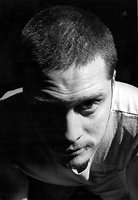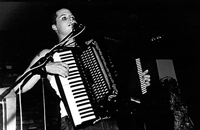|
|
| |
Lost
Instruments,
Found Voice
musician
Mark Growden
|
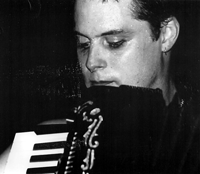
|
|
|
| by
Mark Beers |
|
| |
|
The prison
work song rhythm of two hands clapping announces the beginning
of a Mark Growden solo performance. Dressed in green cargo pants
dangling patch cords, and a tank top revealing a snaky tattoo
crawling up the nape of his neck, he’s got the build of someone
who might knock down retaining walls for a living. And the walls
do come down as Growden commands a space among the tables, at
the edge of the dance floor, or along the bar—not on stage—his
palms slapping together in prayer-like invitation to the audience,
so that by the time he calls out the first lines, "Takin’
my time/ Gonna take my time/ … Doin’ it slow/ Gonna
take my time/ … Ain’t no hurry/ No push, no rush …"
("Takin’ my Time," Downstairs Karaoke),
the crowd has joined him, returning line for line, clap for clap.
"That connection—that’s what it is for me. If I’m
not connecting with an audience, it’s work, and I don’t
want music to be work," says Growden, who, nonetheless, works
the crowd and depending on his reading of the audience, picks
up a banjo or straps on his accordion for the next song.
Reviewers find Mark Growden’s eclectic music difficult to
describe without alluding to more familiar names from the pop
consciousness, and so his music has been described by some critics
as a transmuted pastiche of Tom Waits, Richard Thompson, Frank
Zappa, the Beatles, Beck, Kurt Weil, and David Byrne, to name
a few. Growden gives these comparisons mixed reviews.
|
|
| |
|
|
|
|
|
|
|
|
|
|
Mark
Growden’s Top Ten
particularly influential musical moments
—listed chronologically:
-
Dancing
to Sly and the Family Stone out in my dad's workshop when
I was 6 or so.
-
Watching
the High School Seniors walk out of graduation to "Freebird"
when I was 8 or so. They were all crying. And the guitar
solo rocked.
-
Picking
up the saxophone at age 9.
-
When
I was 10 my best friend had a sticker that said "Disco
Sucks" on his bmx bike. He and I both kind of liked
disco, but we liked the sticker because it had the word
"sucks" on it. One day we were down at the bike
track and a big kid came up to us and said, "That's
a cool sticker. You must listen to Iron Maiden."
We lied and said yes. The next time we had money we got
a cassette copy of Maiden Japan.
-
Sneaking
Crass onto the turntable while my parents were at bible
study when I was 14, 15 and 16. "Jesus died on the
cross for his own sins … not mine" over and
over and over again.
-
Hearing
Dolphy and Coltrane for the first time when I was 17.
-
Taking
acid and listening to Stravinsky's Rite of Spring
when I was 18.
-
Taking
acid and seeing the Art Ensemble of Chicago live when
I was 19.
-
Having
all my instruments stolen when I was 24.
-
Finding
an accordion and my singing voice in a basement a week
later.
|
|
|
|
|
MG: "Okay,
being compared. Tom Waits. Even though Tom Waits uses very little
accordion, people hear accordion—they hear waltz—they
think Tom Waits. And sometimes it just drives me crazy. God, he
did not invent the waltz. But he’s definitely an influence
on me. I mean he’s one of the people who is not doing straight
rock, and I really respect him, and I think he’s a great
song-writer. Sometimes it feels like a compliment, and sometimes
it feels like it’s coming from people who don’t know
music well, not seeing the bigger picture. If they would really
look into it: if they were to say Howlin’ Wolf, I’d
say, yes. Tom Waits and I both are obviously very influenced by
Willie Dixon, Howlin’ Wolf, the Allen Lomax recordings, the
prison work songs, and Stravinsky. Those are my biggest influences.
Bernstein had a great comment: something about "beastly but
transcendent"—utterly beastly but also divine. I really
like that music [prison work songs] and I often strive to draw
from the depths: If I’m writing something and I’m sobbing
while I’m writing it, and getting chills all over my body—"ahhhhh,
ahhhhh"—that’s when I know it’s really good."
What about Kurt Weil?
Besides
hearing the obvious, like "Alabama Song" and "Mac
the Knife," I had never owned a Kurt Weil album, but he was
never a direct influence on me. I couldn’t figure out the
direct comparison, but then I listened to him, and oh yeah, well,
of course. I can honestly tell you I didn’t listen to Kurt
Weil, and I actually purposely avoided him for a while because
people had compared me to him. But anyone who’s doing a waltz
on accordion is going to be compared to Kurt Weil.
It’s not necessarily the waltz, but
the dark, cabaret style, the lyrics and sensibility, creating
an atmosphere where it might be possible to get stabbed in the
back.
And
I love that. It’s probably from being a little death rocker
in high school. The other person who I get compared to is Nick
Cave, not because of our voices certainly, but because of the
aesthetic, and we’re both influenced by the prison work songs.
Like "The Mercy Seat"?
That
song is amazing. I’m not crazy about his arrangement on that
song, but the words are great. I wouldn’t say he’s much
of an influence. I really respect him, but I’m not bowled
over by him.
I think Nick Cave’s father is also a preacher.
It
wouldn’t surprise me. They [preachers, preachers’ sons]
tend to go in the opposite direction—"son of the preacher
man."
Actually, my biggest influences are my instruments. The reason
I play waltzes and stuff like that is because the accordion works
extremely well: I didn’t write waltzes before I had an accordion.
And the banjo really influences me.
|
|
|
|
|
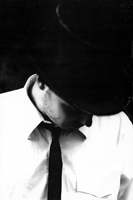
|
|
|
You’re
a charismatic performer. Is it because of what you’ve developed
as a performer or has it always been there? I’m not asking
you to brag.
It’s
both. It’s partly my Irish thing. I get really—aahhh!—passionate
and animated about things. That’s always been there, but
it’s really developed. Before, I would rely on inspiration,
but then it’s like tossing a coin: you don’t know when
that magic’s going to be there. I’m a much better performer
now because I have learned skills like reading the room and being
very sensitive to things.
And the audience really responds.
Music
is passion and love, and I want to share that. It’s like
sex. You know, if you’re with someone and they’re like
a fish, you can still try to make it into something; but if it’s
not there, it’s not there. I’d rather create the situation
and wake up the fish.
|
|
|
The
Sex Trilogy
Which leads, conveniently, to a discussion of what to do with
an unresponsive audience. You know the crowd at a bar: a soloist
is performing, and the chatter lays over the music like static
on the car radio, but you stubbornly stay tuned because you’ve
played all your road trip cassettes and you’re trying desperately
to hear the first really good song for miles. Then, as if you’ve
just arrived in range of the transmitter, the static dissolves—the
chatter abates, mute wide-eyed looks are exchanged—and the
audience attends, gaped-mouthed, to Mark Growden playing accordion
and singing,
"I
miss spreading your cheeks and licking your bum/
I miss kissing your lips when they’re soaked in my cum/
I miss grinding and grinding and grinding til dawn/
I miss doing the nasty with you,"
while a frame
by frame slide show provides the visual accompaniment showcasing
Mark’s sexual imagination with a blow-up doll girlfriend.
|
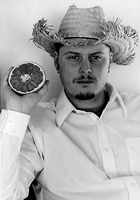 |
|
So
how do you feel about an inattentive crowd that suddenly starts
paying attention when you do the Sex Trilogy ["Doing the
Nasty" (excerpted above), "Mother," and "Fuck
Boy"]?
I don’t like being in that situation. I am playing
acoustically, and some people up front are really listening, but
then there are all these people in the back swigging and yelling
to each other. It’s always harder performing solo, but performing
solo without amplification makes you a better performer. It’s
like lifting weights—it kicks your ass. You have to go up
there and take over the room with your presence—your voice,
your sound, your material. If I can perform without a sound system,
I do it because it’s more raw and direct. The fewer layers
between me and the music and the audience, the better. So when
I do the Sex Trilogy and they start listening, it’s better—I’d
rather have them there. I don’t feel insulted. Playing the
Sex Trilogy is a blast, and it really reflects a side of me. I’m
a very sexual person. That’s my nature, and I’ve always
been that way. So it doesn’t bother me to pull it out in
that situation; in fact, it’s kind of a relief. Although
sometimes it’s hard to sing "Fuck Boy" [inspired
by a second grade teacher, to whom the song’s narrator volunteers
himself as a sex slave, and then the roles reverse]. I don’t
want to be Fuck Boy. It’s not about ME. It’s about unh,
gettin’ it on, and it’s fun to sing. But sometimes I
won’t even play the Sex Trilogy. People will be yelling for
it, but I want to play other stuff.
Otherwise you’ll become known as that guy who plays the sex
songs?
Yeah, and that’s why I’m worried about recording it.
I’ve already got a couple of albums out [Downstairs Karaoke
and Inside Beneath Behind], besides the Sex Trilogy, and
I’ve got at least two more albums of material that I haven’t
recorded yet.
So what does your mother think
about "Mother"? ["Mother,"
titillates and/or embarrasses some because its lyrics probe lovingly
at taboo: "Did you come when I came?" asks the song’s
narrator of his mother in one verse about his conception.]
She’s never heard it.
Some day she might.
It’s coming out, though, on a CD. It’s not about her;
it’s about an archetype. It’s very raw and real. It’s
so honest—a love song. It worries me some. I don’t want
her to feel hurt, but at the same time, I’ve curbed myself
so much for my parents already, and I have to be myself.
I once heard an apparently disappointed
woman comment after hearing "Mother," "I think
Mark Growden’s gay," because you sometimes sing a verse
…
"I’ve
also had the pleasures of loving a man." It is a first
person song, and I am bi. I had one relationship with a
man years ago. I’m actually not singing that verse now, not
because I don’t want people to know it, but because it makes
the song less universal, unlike the rest of the song.
I like poetry, I like metaphor, much more than I like the confessional
stuff. I have other songs like "Inside Every Bird" [Inside
every bird/ There’s a smaller bird flying faster/ And inside
that bird there flies another] (Inside Beneath Beyond,
Mark Growden’s Electric Piñata), and people say, "What
is that about?" I can’t tell you. I could, but I’m
not here to tell you what the song’s about. With most of
my stuff, I’m really trying to "paint" and trying
to create images and little mind-bombs—little things that
don’t say everything but let the listeners imagine instead
of me spelling it out. I love descriptive language, but not going
too far with it.
It forces participation from the audience.
Yeah, and for me, that’s being respectful [to the audience].
It’s about me giving them something. It’s service. That’s
what music is to me. The audience are giving you their time. That’s
their most valuable resource, not to mention that they paid the
door, which is usually not that much, but still they’re giving
you their time.
Mark the
Monk:
Mark Growden grew up in the California mountain towns of Westwood
and Pinetown (or Oldtown, depending on who you ask) near Nevada.
His house was next to the woods with BLM land practically in his
back yard. A trip to Stockton for band camp turned the twelve
year old Growden into "the first skate punk" in his
hometown. Alternative political thought and death rock alienated
him from his "dominantly redneck" community and freaked
out his parents whose Christian fundamentalism (his dad was assistant
pastor of a local church) came under attack through Mark’s
challenge to their belief in the bible. He was forced to go to
church on Sundays, but when Mark was in the eleventh grade, the
conflict came to a head in a huge cussing fight after which he
ran away in his 125 dollar Oldsmobile, leaving a red-lipsticked
"fuck you" goodbye on the bathroom mirror. In the end
he got what he wanted: If he returned home, he would never have
to go to church again. "And still my parents know not to
even mention it to me, but they’re fine with me now. They’re
into what I’m doing, and if they’re in the audience,
I don’t play certain songs, although they have heard "Fuck
Boy." "They haven’t mentioned anything: it’s
just kind of hush hush."
Perhaps because, or in spite, of the family’s religious influence
on him, Growden set off on his own spiritual journey. At the age
of nineteen, inspired by study of Eastern spirituality, he decided
to give up all of his belongings and wander. His Fresno State
music teacher, Loren Pickford, also lent a hand in pushing him
out on the road: He put his hand on Mark’s chest and said,
"This is your instrument. Don’t stay here. I can only
teach you to play like me. Go do your thing. Quit school, go travel."
For a couple years—19 or 20 till 22—he traveled all
over the U.S., Canada, and Mexico, but mainly the western states.
"I did this walk across Washington, no money, no sleeping
bag, no food, nothing. What’d I have? I had some juggling
balls, carving tools for carving wood, bone, or antler because
if I stayed with someone, I liked to carve something while I was
there and then when I left, I’d give it to them. That was
one of my little practices."
How’d you survive without
money?
I ate wild foods—wild berries, horse tail, watercress. I
met people who took me in and they gave me whatever there was.
I remember the night before my walk across Washington, we slaughtered
a baby goat, and that was the first time I had eaten meat in a
couple years—at that time I was vegetarian—and it was
so good: fresh killed goat, barbecued on an open fire at this
farm where I was staying. In Mexico, up in the mountains at this
rancho, they told me they were eating wild burro, and we were
having burro asada. I never really knew if they were just messing
with me. I could have been eating burro, I don’t know. Another
time in Mexico, I was so hungry a woman gave me some hot salsa,
and I ate it.
So I survived and it was great for me, but at the same time I
learned it’s easy to be all the things you want to be, loving
and such, when you’re on the road and you don’t have
any attachments and don’t have a job, just wandering.
So you could be an altruistic, loving person because you were
unattached.
Oh yeah, you’re just wandering and everything is nice and
easy, but that became very unsatisfying and I knew that I had
to come back to the world and start serving, to start using my
gifts. I was really glad I did the walk, but I thought I would
never stop. I was just a kid walking around, nothing special.
Nothing transcendent to report?
There were moments that were transcendent, utterly mind-blowing,
and my faith is a lot stronger from it, although lately it’s
been a little shaky.
Faith in what?
Just faith, just believing that it’s all one and going with
it and knowing that I’m just a little tiny bit of carbon
that’s part of this larger organism, and not to worry about
it so much, but I still worry about it. For a while there I had
some pretty good faith, and then through various experiences I’ve
gotten a little jaded, like we all do.
|
|
Lost
instruments, found voice:
Tell us the story of having your
instruments stolen.
I was doing the Edge Festival, I think, at Footwork dance studio.
Somehow, someone moved my stuff out of the lockup into another
room and all of my instruments got stolen: my saxophone, which
was my main instrument, a medieval flute from Norway, flutes from
Africa—a bunch of wind instruments. And it was all gone and
I didn’t have anything to play, so that night I started singing.
Didn’t you believe you could
sing before?
No. well, I would sing along with something maybe. I was not a
practicing singer. Later that week [after my instruments were
stolen], I found some old funky accordion in the basement of the
school where I used to teach. I started writing songs and "Mother"
was probably the second or third song I wrote with accordion.
I was 24 or 25.
|
|
|
|
Most
people associate you with accordion now.
I play accordion, but I play other stuff. I’m a singer and
composer, and I identify more as a composer than as an instrumentalist.
So losing your equipment totally changed everything.
Oh, it changed everything and it made it so I could be a one man
band: I can just show up with acoustic instruments. I’m really
focusing on the solo thing because it’s more logistically
feasible and lucrative too. I love playing with my band—all
brilliant musicians—it’s just that touring with a band
is really expensive. Plus now I’m becoming a singer. Before
that, if I had done a solo saxophone show, and even though I play
djijeridoo, clarinets, and flutes and all these different instruments,
a solo show of someone playing a wind instrument—no harmony,
no interaction, just single line melody—gets tiresome pretty
quick. But when you throw in voice—the human voice is so
stirring—lyrics, story-telling, poetry, then you’ve
got a show if you can pull it off.
And your other setback, the tour
bus break down?
Recently I had an album come out and I bought a bus, the first
tour in a year, and even before the first show, the bus broke
down on the Grapevine on the way to LA and I lost over 7 thousand
dollars. I got crushed. It was terrible: I have kids, and with
the whole dotcom thing, I really got smushed by that. I was broke—I’ve
never been in debt like this before. I closed my record label,
I shut down my screen-printing shop, pulled the record back from
the distributor—I wanted to be selling the record on another
label and really do it right because I can’t run a label
anymore. I mean there are some really cool things about running
a label, but I don’t want to be a businessman. I just want
to play music and have someone else do that.
So the legacy of that breakdown is a 7 thousand dollar loss?
We did a benefit and made four hundred dollars, which helped,
but it’s not nearly enough. So I went back to teaching kindergarten
through sixth grade music—full-time, just started in September.
The bus was a serious blow in the stomach, but you know, it made
me rethink everything.
How so?
I’m actually in the process of relearning accordion—another
style of accordion. I am pulling back and planning to go on hiatus
from performing and really focusing on writing a bunch of new
material, and finishing this song cycle of the "Crooked Rose"
stuff. I want to take voice lessons for the first time.
It sounds like you have a great voice. It’s not untrained
is it?
It is untrained. I have picked things up. I feel really good about
my voice now; I know I can go in and sing—my pitch is good,
but I don’t want to rest on my laurels. I could just keep
going along, but I really want to develop my skills.
So do you have to depend on disasters
to develop musically? First, there was losing your instruments
and then the bus broke down. Each case seems like a major turning
point.
Ha ha. Not always. Having my instruments stolen was huge, musically,
but the bus break-down was more of a financial turning point.
My lifestyle changed because of that: I haven’t had a full-time
job in years, only once, and it wasn’t really full-time.
Is there anyone you would like
to give credit to—collaborators, mentors, etc?
In terms of thanking people, I always thank my mentors, Warren
Pickford, my teacher in Fresno who told me to leave college. Doug
Goodkin, who was a brilliant, masterful music educator, who I
studied with. Renny Charlip. Ruben Boaz who owns Boaz Accordions:
he’s paid for lessons for me, and I have a sponsorship from
his company. They’re building me a custom accordion right
now. And my family—despite all of our trouble in the past—have
really supported me, and they believe in me. For a while when
I was a child, they thought, whoa, this kid is out to lunch—they
couldn’t understand it at all. I think now they do, though,
and they see how it’s going good for me. I call them every
week now. And there are my children. I mean they kick my ass.
How so?
I can’t fuck around any more. I was much more diffuse before;
now I’m much more like a laser—they make me focus. And
then there’s Alcina, their mother, who’s been a very
good friend and really supported me a lot. Also Mika and Tom Sepe.
It’s not so much that I’m looking for support for my
music. I know I’m a musician, and I know that’s what
I’m supposed to do—I practice hours every day, but I
love doing it. But my work is not in being a musician; my work
is in becoming a better person.
Mark Growden’s music may not be work
for him—an oft-heard pronouncement from the best in any profession—and
if in addition to his composing, full-time teaching, and fathering
duties, giving us several shows a week (often including unpaid
benefit performances) is not work, but part of becoming a better
person, then raise your glasses and drink to Mark Growden becoming
a better person. Cheers! But cut the chatter, pay attention, and
have your way with this hard working, exceptional artist.
|
|
BIO
Writer and teacher Mark
Beers still lives in the mission. |
|
|
|
|
|
|
|
|
|
|
|
|
|
